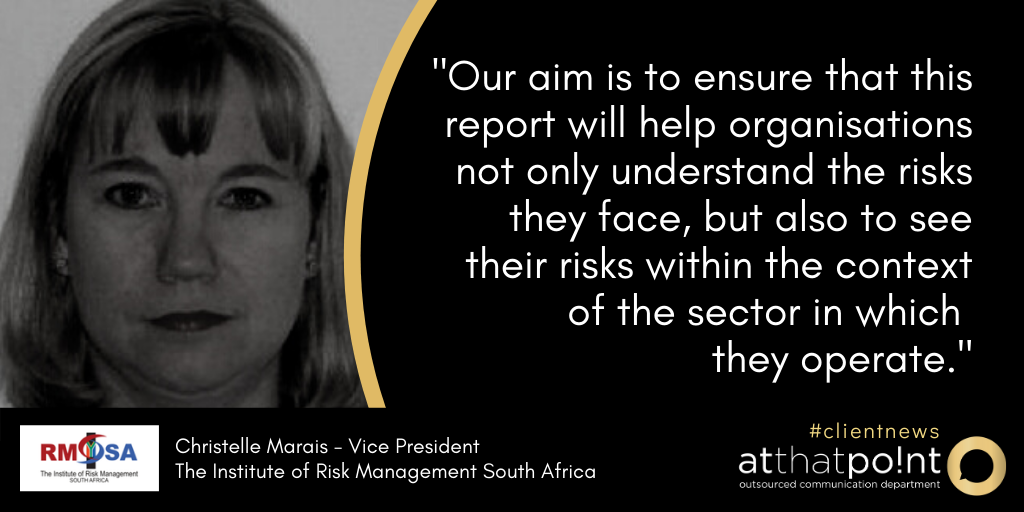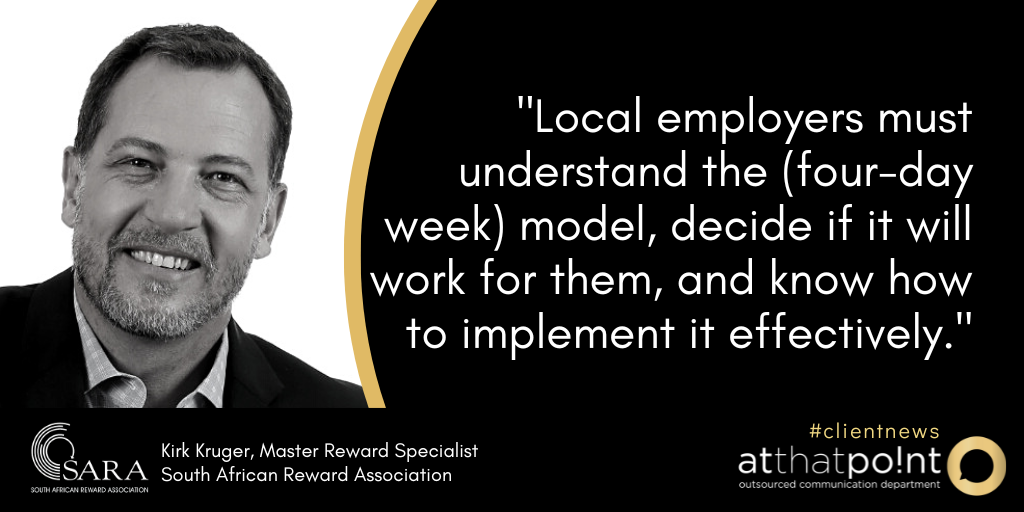|
Internationally, there is a growing trend to reduce executive pay in response to the current COVID-19 crisis.
South Africa is following the trend, with several private sector companies voluntarily announcing reductions and donations in executive pay, among them Woolworths, EOH, FirstRand, Vodacom and Sibanye. The South African Reserve Bank’s Prudential Authority, the banking sector regulator, has asked banks to avoid paying ordinary dividends or executive bonuses this year and of course, our President announced in his more recent addresses to the Nation that cabinet members will take a 1/3 pay cut and contribute this to the Solidarity Fund. Martin Hopkins, President of the South African Reward Association (SARA) and Master Reward Specialist, says getting executives to lead by voluntary example by accepting pay reduction at this time is the appropriate thing to do from several viewpoints. “As a gesture of solidarity at this time, executive pay sacrifice can be a powerful morale booster and could provide a way to repair some of the damage caused by the perception that executives are over-rewarded” he says. “Executive pay cuts, along with dividend freezes, also make sound business sense because, in uncharted waters like these, conserving cash is going to be key to survival - and thus to keeping as many jobs as possible.” Dr. Mark Bussin, SARA executive committee member and Master Reward Specialist, says: “If there is one thing that the Corona Virus crisis has done, it has united us against a common enemy. I have seen so much goodwill between communities. I almost want to be thankful that we got this wake-up call. Perhaps we can explore this comradery further by each organisation seeing all employees in the same boat and showing more sympathy and empathy towards each other. This should include a deliberate effort to narrow the wage gap. Let’s not waste a perfect crisis”. As Mr Hopkins points out, executives are likely to be able to better weather a significant reduction in their income than low earners who subsist from pay-check to pay-check. He expects that most variable pay, which makes up a significant portion of the remuneration of top executives, would be curtailed—although most performance targets are in any event unlikely to be met if the economic fallout is as bad as predicted. He suggests that executives could be incentivised to lead their business to survive the crisis and thrive in the future by means of restricted share awards rather than cash incentives, even though these would have the effect of diluting the assets of existing shareholders. Any such awards should be granted prudently to mitigate the perception that executives are taking undue advantage of currently depressed share prices. Looking beyond the short to medium term, Mr Hopkins says he does not foresee that these emergency executive pay cuts will necessarily translate into a permanent reduction in the wage gap between a company’s executives and its lowest paid employees. He believes that ultimately pay is governed by supply and demand, as well as the imbalance in negotiating skills between executives, company remuneration committees and shareholders. These factors will not disappear, and shareholder activists will continue to have limited room for manoeuvre given that shareholder votes on remuneration are typically non-binding. He speculates that if enough companies close down, there might be a glut of top executives looking for jobs, and this could bring down executive salaries. Mr Hopkins also comments that the issues of poverty and unemployment may be more pressing issues and drivers of fundamental inequality and suffering than the corporate wage gap. “At the end of the day, human dignity and well-being is highly dependent on the ability to earn a living wage. We should be focusing our efforts on ensuring the maximum number of people have a job and are earning a living wage,” he says. Nicol Mullins, SARA executive committee member and Master Reward Specialist says: “There is an incredible opportunity for organisations to unite and build trust. The call to reduce compensation and contribute to assist others in need is not only answerable by executives, but by all to the level of where it makes sense. Nothing stops the rest of a workforce to contribute voluntarily. What we need right now is not the money of a few, but the collective action of many – meaning financial, and through other means.” “The recent proposal by 65 economists, academics and business analysts for a universal basic income grant of R1 000 for four months also has merit to protect the vulnerable whilst we reboot the economy”. The work that organisations have done is admirable, specifically around the sacrifices executives are making, but this can be short lived once the crisis is abated if the focus falls away. The result could mean that the after-effects of COVID-19 is that the wage gap will not shrink because some segments of the population will be affected disproportionately. “Many lower skilled jobs may start to fall away as time progresses and ways of work evolve”, says Muhammed Goolab, SARA executive committee member. ENDS MEDIA CONTACT: Rosa-Mari Le Roux, 060 995 6277, [email protected], www.atthatpoint.co.za For more information on SARA please visit: Website: www.sara.co.za Twitter: @SA_reward LinkedIn: South African Reward Association Facebook: SARA – South African Reward Association
0 Comments
Successful business leaders know they need a solutions-driven mindset to overcome business challenges and to strategically solve problems, but individuals in South African along with the Private Sector are not optimally using their skills collectively to help solve the country’s problems, says Nicol Mullins, Chartered Reward Specialist and Executive Committee member of the South African Reward Association (SARA).
“It’s easy to complain about fraud and corruption – and thereby contribute to the wave of negative messaging that makes people so despondent – but it takes critical thinking, creative problem-solving and innovation to overcome many of the challenges we face. South Africa already has these skills centred in its people. SARA is calling on the private sector to start pooling its intellectual resources and collaborate to solve issues of national importance,” says Mullins. Don’t look for safety. Create it. Mullins quotes author and motivational speaker, Simon Sinek, who famously said that instead of looking for the perfect place to work, you should create the perfect place to work. When it comes to politics and government, says Mullins, contributions made to the solutions in South Africa have – for the most part – been lacking, with many individuals sitting on the fence and taking an outside-in view on the country’s problems. He says this approach isn’t going to contribute to a better South Africa, and that instead of looking for safety, we need to start creating a space of safety in South Africa. We can all do so, and through our action create pockets of excellence. “The electricity crisis, for example, isn’t an Eskom problem – it’s a South African problem. The sooner we face that it’s going to take more than a single organisation or the government to get the country back on track, the sooner the road to recovery can begin,” says Mullins. Stretching resources will lead to innovation Many companies currently have limited financial resources with which to compensate their staff. As a Total Reward Professional, Mullins says he knows how far and wide these resources need to be stretched to engage staff, but this is the sweet spot where innovation happens. The effect that COVID-19 will have on the global economy will be long-lasting, South Africa is not insulated from this impact. This unprecedented time in South Africa will bring with it uncertainty but allow people to think out of the box. Our future will be shaped by our ability to stand together in unity and our ability to solve problems with fewer resources, in a smarter manner. “When you have limited resources, you are driven to innovate and think within the boundaries forced upon you. With unlimited resources, however, you tend to squander and drift from your strategy. South Africa’s current situation is an opportunity for all of us to be a part of the solution. Collectively, we can solve our country’s problems and make things work again,” says Mullins. Mullins concludes by saying that enabling and mobilising the country’s skilled resources will unlock the collaboration that is needed to start acting locally instead of waiting for the situation to change. “Many people are talking about immigrating, but my question to them is: where in the world are things going great at the moment? South Africa has its challenges, but also so many things going for it. The change needs to start with us on an individual level. We need to shift our energy from criticism to collaboration. Instead of looking towards other people or government to solve South Africa’s problems, we need to start thinking about what we can do. How can each one of us contribute meaningfully to an already incredible place? Let us work together to #LiftAsWeRise as a collective. ENDS MEDIA CONTACT: Rosa-Mari Le Roux, 060 995 6277, [email protected], www.atthatpoint.co.za For more information on SARA please visit: Website: www.sara.co.za Twitter: @SA_reward LinkedIn: South African Reward Association Facebook: SARA – South African Reward Association |
Archives
March 2023
Welcome to the South African Reward Association newsroom.
Categories
All
|



 RSS Feed
RSS Feed